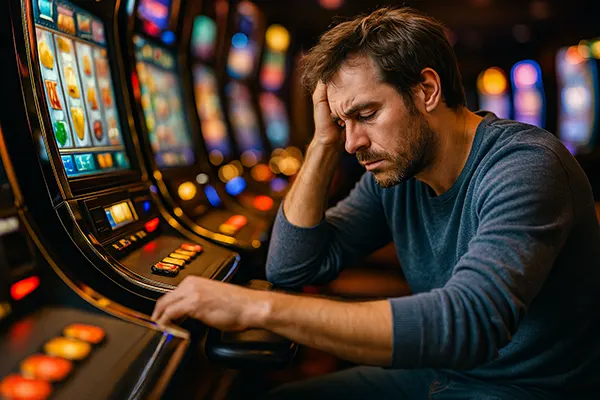Impulse on Autopilot: How Fatigue and Hunger Affect Decision-Making in Gambling

When we are tired or hungry, our brain doesn’t operate at full capacity. In fact, our ability to make reasonable decisions can significantly deteriorate. This is especially dangerous in gambling, where quick impulses often dictate action. This article explores the neurological and psychological foundations of impulsive decisions caused by fatigue and hunger, supported by research and practical behavioural advice.
Why Fatigue Disables the Prefrontal Cortex
The prefrontal cortex is responsible for logical thinking, risk assessment, and long-term planning. It is this part of the brain that keeps impulsive behaviour in check. However, under fatigue, its functionality diminishes, leaving impulsive subcortical regions more active. This means we act more spontaneously, often disregarding potential consequences.
When the prefrontal cortex is weakened due to tiredness, we become more prone to chase losses, ignore betting limits, or even log into a gambling site without a clear purpose. It’s not that we lose knowledge of odds or probabilities – it’s that our restraint systems are on pause.
This explains why tired individuals are more likely to fall for ‘quick win’ illusions, often repeating the same behaviour even after repeated losses. The biological impulse to seek dopamine overshadows rational analysis.
Emotional Shortcuts and the Tired Brain
When exhausted, the brain simplifies decisions by leaning on emotional responses. For example, a tired player may feel a sudden rush of anticipation and interpret it as a “gut feeling” to place a risky bet. These are not informed choices – they are emotional impulses triggered by impaired neural regulation.
Researchers call this shift the “hot system takeover,” where immediate desires override the logical “cool system.” It becomes increasingly difficult to apply learned strategies, and instead, the person falls back on habits or emotional reactions, which are often maladaptive in gambling environments.
These behaviours are not signs of recklessness or addiction per se – they are biologically explainable patterns that can affect even experienced players when fatigued or depleted.
MIT Study on Sleep Deprivation and Risk Decisions
A comprehensive study conducted by MIT revealed that individuals suffering from sleep deprivation displayed significantly higher risk-taking behaviour. When tested in simulated environments, these subjects were more likely to disregard negative outcomes and repeat harmful choices despite past losses.
The research showed that sleep-deprived participants had lower activity in the dorsolateral prefrontal cortex, confirming the link between fatigue and poor impulse control. Interestingly, their confidence remained high, even as their success rate declined. This creates a dangerous illusion of control.
In the context of gambling, this leads to riskier bets, overestimation of personal skill, and ignoring previous patterns of failure. Without rest, the brain’s rational engine is disconnected from the steering wheel.
Real-Life Patterns in Late-Night Gambling
Online casinos record spikes in activity between 2 AM and 4 AM – hours when the average person’s cognitive capacity is at its lowest. This is no coincidence. During these hours, players often engage in more volatile bets and take less time to consider their actions.
These behaviours reflect the body’s circadian rhythm clashing with overstimulation. Players aren’t just tired; they are neurologically vulnerable. Reaction times slow, but impulse readiness remains high. This imbalance creates ideal conditions for reckless decision-making.
Many of these late-night choices are regretted by morning. Awareness of this cycle is critical for those who want to maintain responsible gaming habits, especially if they tend to play after a long day or before bed.

Practical Advice: Never Gamble When Hungry
Hunger affects decision-making in much the same way as fatigue. When blood sugar levels drop, the brain becomes hyper-focused on reward – particularly quick, easy rewards. Gambling offers the illusion of instant gain, making it dangerously appealing when you’re hungry.
Low glucose levels reduce self-control. Research from the University of South Dakota found that hungry participants were more likely to accept unfavourable trade-offs in games of chance, simply because they were chasing dopamine spikes associated with immediate gratification.
Just like tiredness, hunger also reduces the brain’s analytical performance. You might skip over betting conditions, forget about bankroll limits, or convince yourself that a “lucky spin” is about to come – all because your body is signalling a need for satisfaction.
Smart Habits for Responsible Play
Always eat before engaging in any form of gambling – even light snacks can help regulate dopamine flow and stabilise decision-making. Avoid starting a session after skipping meals or consuming only sugary drinks, which may cause a crash mid-play.
Set scheduled breaks during longer gaming periods, and use them to hydrate and assess your emotional and physical state. If you’re too tired or hungry to make a meal, you’re also too compromised to bet with clear judgement.
Responsible gambling starts with basic self-care. Recognising how physical needs influence mental sharpness can protect you from unintentional losses and emotional distress linked to impulsive betting.
